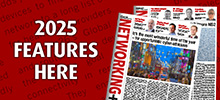07 October 2024

Glen McCarty, consulting director, Velocity Smart Consulting
Who was your hero when you were growing up?
My father. From a very young age he taught me the value of education and personally tutored me to a high school level of education before I finished primary school; being one step ahead has always been an enormous advantage (although freaked out a lot of my teachers who had no idea what to do with me), and I credit my father fully for the man I am today, both vocationally and personally.
What was your big career break?
My promotion to transition director in the early 2000s was a seminal moment. Until that point, I had worked extensively in several industries and had been focusing on call centres (working initially as an agent, then as supervisor and manager, and eventually setting up new ones), but in my TD position, I not only gained budget line authority which raised me from being task-driven to business outcome-orientated but also moved very much into setting up IT outsourced services which not only included service desks (which was where I came from) but also all other IT services for delivery, which opened a door to my IT consulting career.
A second career break came when I met Velocity in 2013. I consider myself very lucky to have met my now business partners at such an early stage in my career, and my early role with Velocity as a consultant expanded and grew to first director and then partner. I will be forever grateful to Stuart, Anthony and Lyubo for taking me in and giving me the space and support to grow.
What did you want to be when you were growing up?
When I was 14 I attended an appointment with a careers advisor who asked me that very question. I told her that I wanted to design microchips in Silicon Valley. She looked at me blankly and handed me a leaflet on how to become a pharmacist. Clearly in the 1980s most adults had never heard of ‘IT’ but I knew it was the future even then.
I have no idea what happened to the careers advisor, or if she ever came to know what a microchip was, but I felt I had come full circle when I performed some consultancy work for Arm; the world’s leading microchip designer. I worked for them in Cambridge rather than Silicon Valley, and I wasn’t a designer, but it was close enough for me.
If you could dine with any famous person, past or present, who would you choose?
Alan Turing. He had the most brilliant mind, decades ahead of his time, and I would love to understand if he knew what his work would eventually become.
What’s the best piece of advice you’ve been given?
The saying ‘work smarter not harder’ is an excuse to be lazy; there is no compensation for hard work, however smart you are. If you want to succeed, put in the hard work and do it before anyone else – that’s how you win.
If you had to work in a different industry, which would you choose?
My mother always thought I would make a great hairdresser, but I suspect it was mostly because she wanted free haircuts. If I hadn’t moved into IT I would probably still be working in large customer service call centers which is where I started my career.
If I could do the whole thing again I would probably choose medicine and train to be a doctor as I think I would make an excellent diagnostician, as I have an encyclopedic memory and am a highly logical thinker. I suspect my bedside manner and the fact I get queasy at the sight of blood would have been an issue, but nobody is perfect.
The Rolling Stones or the Beatles?
The Stones; they’re more edgy, and I think have stayed relevant longer than the Beatles. (Don’t tell my father – he’s a huge Beatles fan).
What would you do with £1 million?
Although I’d love to think I’d be smart and invest it wisely, I would probably spend most of it on ill-advised luxuries and treating my friends. My grandad always told me that there are no pockets in a shroud, so to enjoy money when I have it, and I’ve always held to that – the things we buy with money are far more important than the money itself. We always remember the smile on someone’s face when they get a great gift but forget how much it cost almost immediately.
Where would you live if money was no object?
I already live in central London – I think ‘money is no object’ was one of the questions the estate agent asked me before I moved in.
What’s the greatest technological advancement in your lifetime?
Personal computing. The move in the 1970s and 1980s away from large mainframes which were only accessible to a few large businesses to a commoditised product within the grasp of almost anyone was a seismic shift in technology.






.jpg?lu=248)

